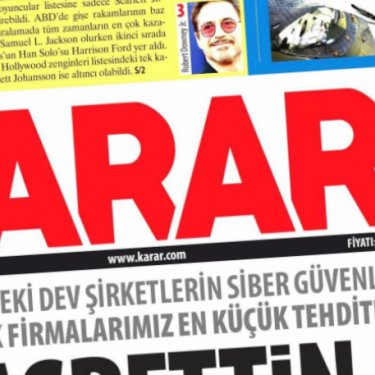Death threat reflects hate for outspoken journalists in Turkey

Reporters Without Borders (RSF) condemns a death threat by jailed Turkish mafia boss Alaattin Çakıcı against the daily Karar, regarding it as a reflection of the climate of hate being fostered towards journalists in Turkey, one that the authorities must stop.
Briefly posted on Instagram on 29 June, Çakıcı’s message began: “All my life I have always given an advanced warning to those I am about to harm.” After naming several of Karar’s journalists, the message added: “They will be punished in Turkey or abroad. To those who have told me, ‘Order us to kill, order us to die,’ I say: ‘Carry out your duty.’”
Six famous journalists are named in the message: Ali Bayramoğlu, Etyen Mahçupyan, Akif Beki, Hakan Albayrak, İbrahim Kiras and Gürbüz Özaltınlı. The gang leader asked his supporters to spare a seventh journalist, columnist Elif Çakır, because “she is a woman.”
Çakıcı has it in for Karar not only because it described his amnesty request as “insolent” in an article but also because, he said, it took part in the “axis of evil” instead of supporting President Recep Tayyip Erdoğan’s alliance during the 24 June election. He added that Karar was in the pay of the United States and the Gülen movement.
“We take note of the protection provided by the police,” RSF Turkey representative Erol Önderoğlu said. “But behind these threats lies a climate of hate towards critical journalists that is fuelled by the authorities, political class and many media outlets. We are extremely concerned about the violence that this incendiary rhetoric could trigger. The authorities have a duty to prevent the verbal violence from becoming commonplace and to send a conciliatory signal.”
After Çakıcı’s message was posted, the police quickly placed Karar’s journalists under protection. Some of them, such as Bayramoğlu, have already been getting protection for several years because of repeated threats. A police car was stationed outside Karar’s office and the prosecutor’s office began an investigation.
Jailed since 2004, Çakıcı reportedly supports the ultra-nationalist MHP, a party that entered into an alliance with President Erdoğan’s party for the 24 June election. MHP leader Devlet Bahçeli has repeatedly called for Çakıcı’s release and visited him in hospital in May. On 26 June, Bahçeli issued a list of 70 well-known figures including many journalists whom he accused of “relentlessly defaming” him during the election campaign.
President Erdoğan and other leaders of the ruling AKP party often subject critical journalists to virulent verbal attacks, calling them “terrorists” or “traitors.” The intimidatory climate intensified during the Gezi Park protests in 2013, and again when fighting resumed against the PKK-led Kurdish rebels in 2015, and has culminated since the coup attempt against the Erdoğan government in July 2016.
The pro-government media also wage a ferocious propaganda war against critical journalists that sometimes includes all-out media lynching.
Turkey is ranked 157th out of 180 countries in RSF’s 2018 World Press Freedom Index. The already worrying media situation has become critical under the state of emergency proclaimed after the July 2016 coup attempt. Around 150 media outlets have been closed, mass trials are being held and the country now holds the world record for the number of professional journalists detained.



